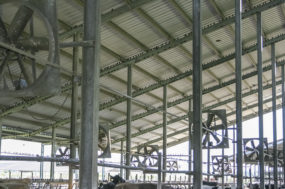Desire in early November for another wave of dairy farmer action morphed into strategizing among dairy farmers from all regions of the nation for a “Dairy Does D.C.” day.

Dairy farmers empowered by a July D.C. experience led the execution of Dairy Does D.C. on December 2 with 100 dairy farmers and their allies, including agribusiness owners and consumers. Individuals in the nation’s capital represented Maryland, New York, Pennsylvania, Kentucky and Tennessee; 30- to 600-cow farms; and organic and conventional dairy farmers. Farmers unable to travel to D.C. complemented the D.C. visit by contacting their representatives’ district offices.
“We accomplished everything we set out to do and didn’t leave a stone unturned. Our meetings involved each branch of government – executive, judicial and legislative,” says Debbie Windecker, a 100-cow dairy farmer from Frankfort, New York, and organizer of the December 2 trip. “We even drew attention for ourselves with a cow costume we brought along. My son, Bryce, walked the Capital campus and had heads turning.”
The day included a short-course of lobbying presented by Chandler Goule, vice president of governmental relations for National Farmers Union; more than 25 appointments with congressional members and their staff; a press conference; and attending a Senate Agriculture Committee hearing.
Delivered messages
Four talking points were agreed upon among the nationwide dairy farmer strategists:
- Cold storage inventory reporting needs to be mandatory and have an audit function.
- Imports of milk protein concentrates need oversight for the sake of food safety.
- A temporary floor price of $18 per hundredweight is needed to maintain a geographically-dispersed milk supply.
- A new price discovery mechanism that is diversified utilizing cost of production with other factors (such as percentage of retail dollar with a supply management component) is needed to achieve an adequate, stable, symmetrical price from farm to fridge.
“We are Political Farming. What I mean is that our visits and phone calls plant seeds of new perspectives, insight and solutions,” says Bryan Gotham, a 600-cow dairy farmer from Edwards, New York. “This trip engaged over 100 people in the process.”
Appointment highlights of the day included the House Agriculture Committee Chairman and Vice Chairman Rep. Collin Peterson and Rep. Tim Holden, the House Education and Labor Committee, the Senate Judiciary Committee, Senate Agriculture Committee and the USDA.
The talking point that garnered the most interest from congressional members and their staff was the need for more accuracy in cold storage reports. To the surprise of dairy farmers presenting the issue, House Agriculture Committee members and their staff were unaware of the November 20 USDA announcement that the supply of Natural American Cheese was over-reported by 3 percent for the first nine-months of 2009 due to lack of cooperation from facilities.
“Our price discovery is blatantly manipulated with lack of transparency and thinly traded on the Chicago Mercantile Exchange (CME). The cold storage inventory reports are voluntarily submitted by companies that purchase through the CME,” says Barbara Martin, a dairy farmer of Lemoore, California. “Many of those CME trading companies, like Kraft and Dean Foods, have reported record profits.”
Messages received
- House Ag Committee members will be acting with hearings and correspondence to the USDA regarding mandatory auditing of cold storage reports.
- The disconnect of farmers and consumers is mirrored in D.C. Fewer congressional members come from agricultural districts, making stand-alone dairy policy improbable to pass and consequently requires substantial negotiating to pass farm bills (e.g., 52 percent of the Farm Bill is a Food Stamp program to benefit urban district constituents).
- Cooperatives can be doing a better job of bargaining a better price for dairy farmers (Capper Volstead Act).
- The Trade Reform, Accountability, Development and Employment (TRADE) Act of 2009 (H.R. 3012) is an important step in fixing American trade policy for issues surrounding agriculture, including milk protein concentrates.
- 2012 Farm Bill development is underway. The House Agriculture Committee has established a task force to build national consensus for dairy policy development.
- Hearings to begin in March 2010 for developing the next Farm Bill. PD



